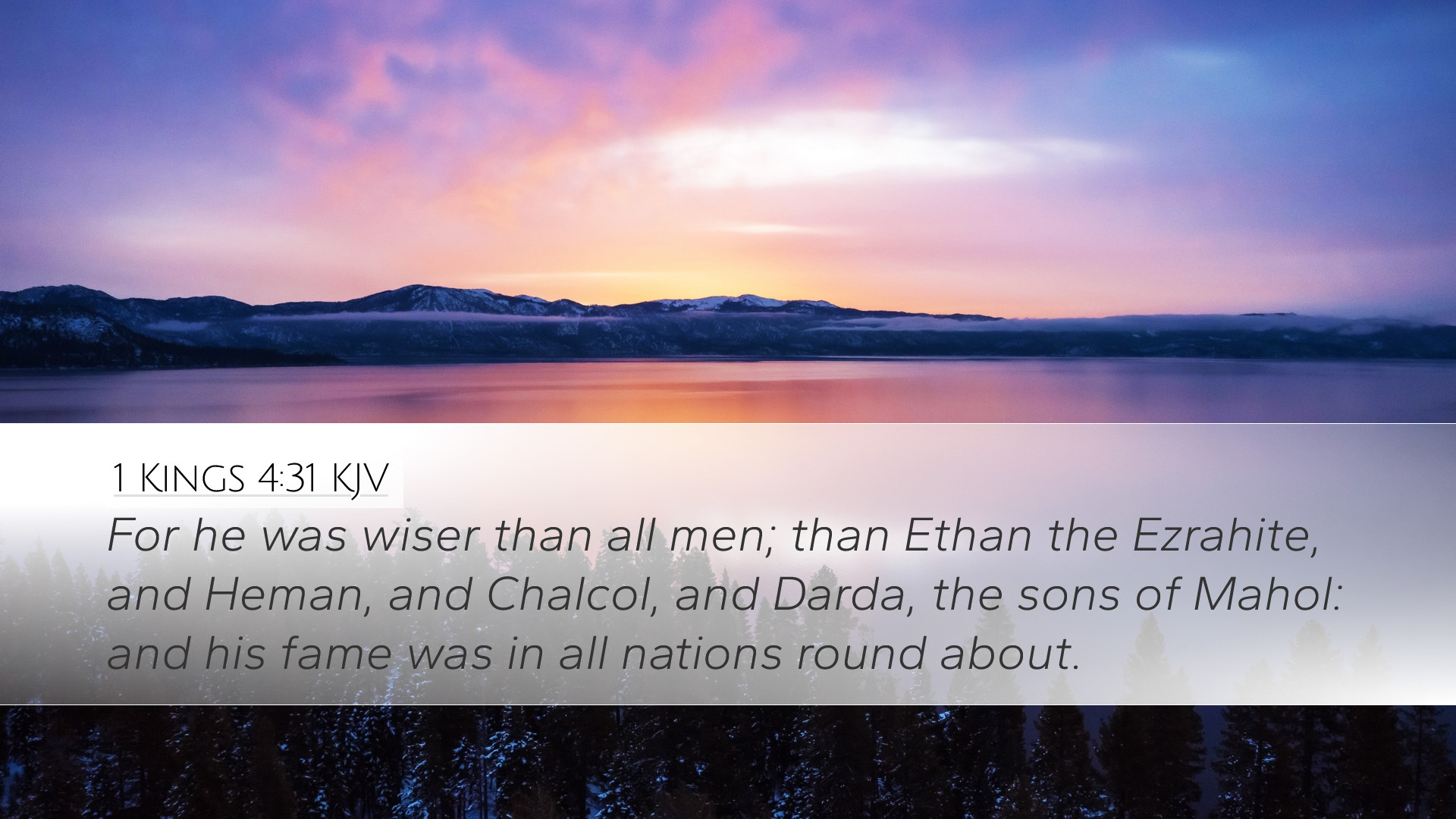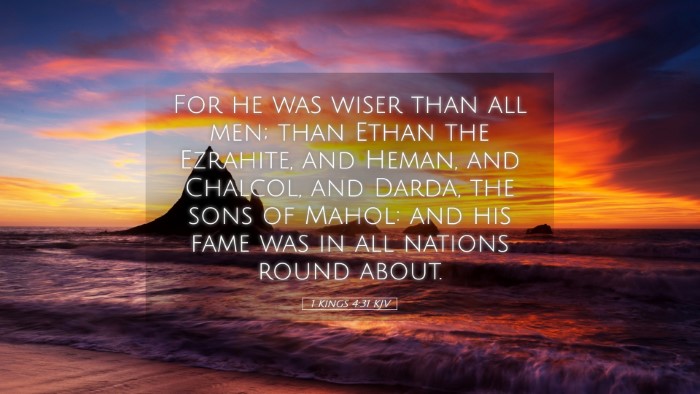Commentary on 1 Kings 4:31
Verse Reference: 1 Kings 4:31 - "For he was wiser than all men; than Ethan the Ezrahite, and Heman, and Chalcol, and Darda, the sons of Mahol: and his fame was in all nations round about."
Introduction
This verse encapsulates the reputation of King Solomon, emphasizing his unparalleled wisdom. It positions him in contrast to renowned figures known for their wisdom in ancient Israelite culture. Commentators provide insights into the significance of Solomon's wisdom, its divine origin, and the implications it had for his reign and its impact on Israel's stature among the nations.
Insights from Matthew Henry
Matthew Henry notes that Solomon's wisdom was a gift from God, a reward for his request for understanding to rule wisely (1 Kings 3:5-14). This divine bestowal is not merely intellectual acuity but encompasses practical wisdom that leads to the right application of knowledge in governance and everyday life.
He draws attention to the notable sages mentioned: Ethan, Heman, Chalcol, and Darda. Henry emphasizes that these men were celebrated for their wisdom, implying Solomon's wisdom surpasses them significantly. This highlights God's choice of Solomon as divinely ordained and sets the tone for his administration.
The significance of Solomon’s fame extending to all nations points to the universal acknowledgment of his wisdom, leading to increased respect not only for Solomon himself but also for the nation of Israel. This elevation in status is rooted in his righteous rule and smart governance.
Insights from Albert Barnes
Albert Barnes underscores the societal and psychological implications of Solomon's wisdom as indicated by this verse. He reflects on the expected outcomes of ruling with wisdom, such as prosperity, peace, and a fear of the Lord among the people. In Solomon, we see a model ruler whose wisdom brings tangible blessings to his observers.
Barnes notes the specific mention of the names listed serves to compare Solomon's exceptional depth of wisdom with those deemed wise in their own right. These individuals, including Heman and Ethan, had prominent roles in Israel's history and were likely known for their extensive knowledge of the law and literature, illustrating the high intellectual standards of the day.
Moreover, Barnes points to the global recognition of Solomon's wisdom as a divine phenomenon that impacts nations. Solomon's fame is indicative of the influence one individual can have when governed by divine wisdom, which suggests that leaders today ought to pursue wisdom as Solomon did.
Insights from Adam Clarke
Adam Clarke comments on the specific men mentioned in the verse, drawing from rabbinical sources that offer insights into the specific achievements of these wise men. He elaborates that these were recognized as the wisest of their time, yet Solomon's wisdom was so profound that he surpassed them all.
Clarke further discusses the implications of wisdom in the biblical context, suggesting that it leads to judicious decision-making and the promotion of justice. He aligns this with practices of governance, whereby wisdom influences legislation and societal norms positively.
In his analysis, Clarke also emphasizes the importance of wisdom as it pertains to understanding human behavior, thereby fostering a society grounded in ethical principles. The extension of Solomon's fame beyond Israel illustrates the notion that Israel, through its king, was intended to be a light to other nations, reflecting God's glory through wise rule.
Theological Implications
The verse presents several theological implications regarding the nature of divine wisdom. Firstly, it reinforces the biblical assertion that wisdom comes from God and should be sought earnestly by leaders and those in positions of authority.
Moreover, it reflects on the character of God's chosen leaders. God's favor bestows wisdom that leads to righteousness, justice, and ultimately, peace—traits that should characterize effective governance.
The mention of all nations recognizing Solomon's wisdom affirms the promise made to Abraham that through his descendants, all nations would be blessed (Genesis 12:3). Solomon's reign signifies a period where the fulfillment of this promise is visible, reflecting the interconnectedness of individual wisdom and its far-reaching effects.
Practical Applications
- Pursuit of Wisdom: Just as Solomon sought wisdom, leaders today must pursue spiritual wisdom to guide their decisions and comprehend the complexities of human society.
- Comparative Analysis: The contrast between Solomon and other wise individuals serves as a reminder to not settle for earthly wisdom alone but to seek divine insight that transcends natural understanding.
- Impact of Leadership: The verse encourages awareness of the broader impact of a leader's decisions on their community and beyond, reflecting on the importance of godly leadership.
- Global Perspective: Recognizing that wisdom can garner respect and influence across cultures, leaders are encouraged to behave in ways that earn both local and global trust.
Conclusion
1 Kings 4:31 serves as a profound reminder of the value and importance of wisdom in leadership. The insights gleaned from respected commentaries illustrate that true wisdom is not merely intellectual; it is a divine attribute that leads to wise governance, justice, and harmony. As scholars and theologians reflect upon this verse, they are challenged to pursue wisdom earnestly, recognizing its source and importance in their respective domains.


